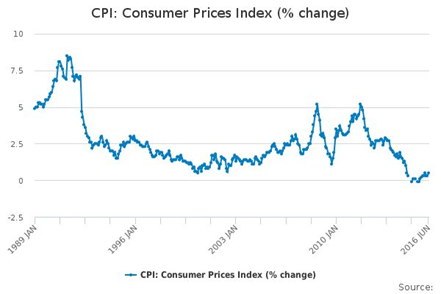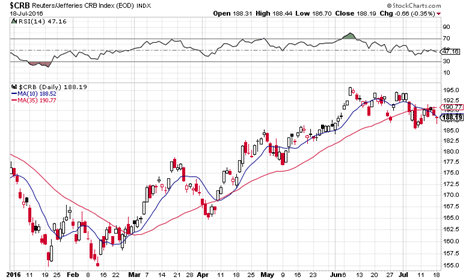Let’s leave the decline and fall of Western civilisation to the side for today. It will happen whether I have anything to say about it or not. Instead, I want you to focus on the iron ore price and inflation. And speaking of inflation, there’s not much of it in Britain, at least according to the Office for National Statistics (ONS).
The ONS released June inflation figures this morning. This is for consumer price inflation (CPI). And it’s pre-Brexit, for what it’s worth. Not that Brexit would obviously affect the figures. But seeing as how Brexit is currently responsible for everything bad in the world, let’s at least note that this data predates the referendum. So what is the data?
Well, as I said, not much. Prices were up 0.5% in June. That follows an increase of 0.3% in May. As you can see from the chart below, inflation is well below the Bank of England’s 2% target. CPI doesn’t include house prices or bond prices of course. There’s plenty of inflation in each of those asset classes. But it is what is. So what does it mean?
 Source: Office for National Statistics
Source: Office for National Statistics
It may be hot outside, but it’s not hot in the economy. That gives the Bank of England plenty of justification for lowering the bank rate (to prevent a Brexit recession of course). The pound, as you might guess, fell straight away after the CPI figures were published. And since we’re following the breadcrumbs today, what might that mean?
Britain on sale
The pound was already down 15% against the US dollar and 17% against the euro before this morning’s fall. And over the last year, the pound has fallen nearly 30% against the Japanese yen. You’d have to think that was a factor in SoftBank’s decision to buy Cambridge-based chip maker ARM for £24.3 billion.
But even if it wasn’t, you can still argue that the pound was overvalued going into Brexit and is now realistically priced (for an economy with a big current account deficit, high household debts, and growing public sector debt). The longer the pound stays lower, the more it’s going to attract foreign buyers to British assets. Capital flows to the UK, then, might increase – at least in terms of merger and acquisition activity (if not property, but don’t be surprised if it happens there too).
The FTSE 100 has loved the post-Brexit world so far. It’s up 11.3% after the big drop immediately following the “surprise” result. It’s up by more than 20% since the closing low on 11 February. But what now? For that, you’re going to have to look at the influence of commodities and energy on the index.
For example, Rio Tinto – a member of the index – fell by 2.8% yesterday. The company announced a 7% increase in iron ore shipments in the second quarter. That was smaller than analysts expected. And there are worries that the 31% increase in iron ore prices year-to-date is fed by Chinese steel production increases that are, themselves, not sustainable. Thus the falling stock price. And commodities in general? See below.

You can see some negative momentum shaping up in the commodities complex, via the Reuters/Jefferies CRB index. It’s been a nice “reflation” from the February lows. But now the 10-day moving average has crossed under the 35-day moving average. And yesterday’s close on the resource index left it below both short-term moving averages. The bear says growl.
You needn’t be a technical analyst to connect the dots. Commodities respond to either genuine demand-driven growth or monetary and fiscal stimulus. Growth in 2016? Good luck finding that. That leaves more rate cuts, bond buying or government borrowing and spending (fiscal stimulus).
The chart tells you without more easy money, you should expect to see falling commodity prices. But the CPI chart above tells you central banks and government Treasuries probably have enough wiggle room to crank up the printing presses without worrying too much about rampaging inflation. And around and around we go with the same old bag of tricks, which do little but generate “flash bubbles” in various asset classes that are fit only for speculating on (not investing in).
There are two takeaways. First, the FTSE 100 isn’t a good barometer of the health of the UK or the British economy. It’s nice that it’s gone up. But it might be time to build a more useful index – especially one that is not so susceptible to price action from the energy and mining giants.
Second, inflation is a silent killer. It comes after one victim: your money. By diminishing your purchasing power and destabilising prices (and values), inflation undermines confidence as well as making you poorer. The conditions are dangerous now. Why?
Too much credit, too much debt, and too much stuff (productive capacity) have made it look like inflation isn’t a threat now, or anytime soon. The monetary authorities – at the bidding of the deep state – have engaged in an unprecedented level of intervention in financial markets because they’re confident it won’t be the kind of consumer price inflation that would alert you to how seriously messed up the system is.
Just keep this in mind. In the past, this kind of distorting intervention by the authorities has always resulted in a wealth-destroying currency crisis (and the unravelling of the social order). It has also resulted in drastic measures to limit your financial freedom of movement.
Do you think today will be any different? It might. But if it is different, my bet is that the main difference is the amount of time it takes for the crisis to unfold. The ultimate result – for individual currencies – can’t be in doubt (devaluation or destruction). The ultimate result – for you – depends on what you do about it.
Category: Market updates

